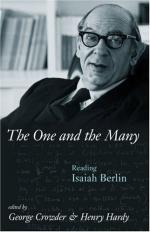|
This section contains 12,884 words (approx. 43 pages at 300 words per page) |

|
SOURCE: “Toward a Coherent Theory of Human Moral Development: Beyond Sir Isaiah Berlin's Vision of Human Nature,” in Political Studies, Vol. XXXI, No. 3, September, 1983, pp. 370-93.
In the following excerpt, Kocis criticizes the use Berlin makes of rationalist and romantic thought in his philosophy of liberty, and Berlin responds.
Sir Isaiah Berlin rightly contends that the ‘ideas of every philosopher concerned with human affairs in the end rest on his conception of what man is and can be. To understand such thinkers, it is more important to grasp this central notion or image, which may be implicit, but which determines their picture of the world, than even the most forceful arguments with which they defend their views and refute actual and possible objections.’1 Despite Berlin's belief that this basic vision of human life ‘will, as a rule, turn out to be relatively simple and unsophisticated’,2 his own image...
|
This section contains 12,884 words (approx. 43 pages at 300 words per page) |

|


